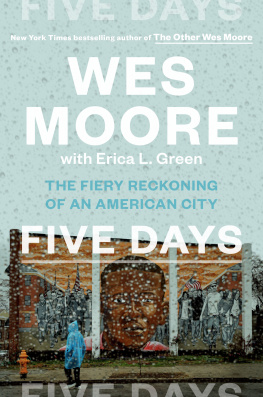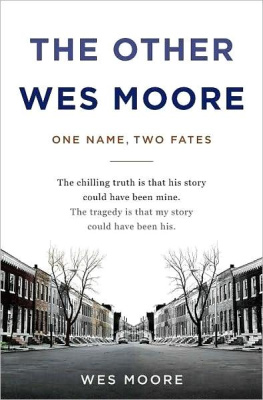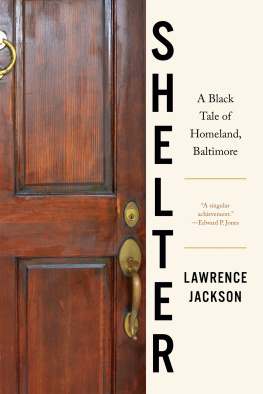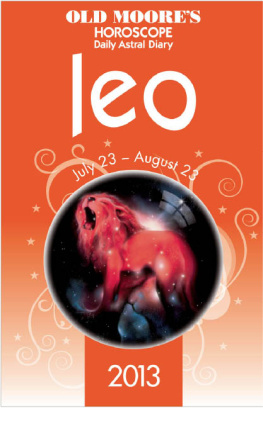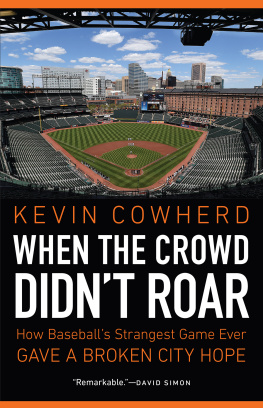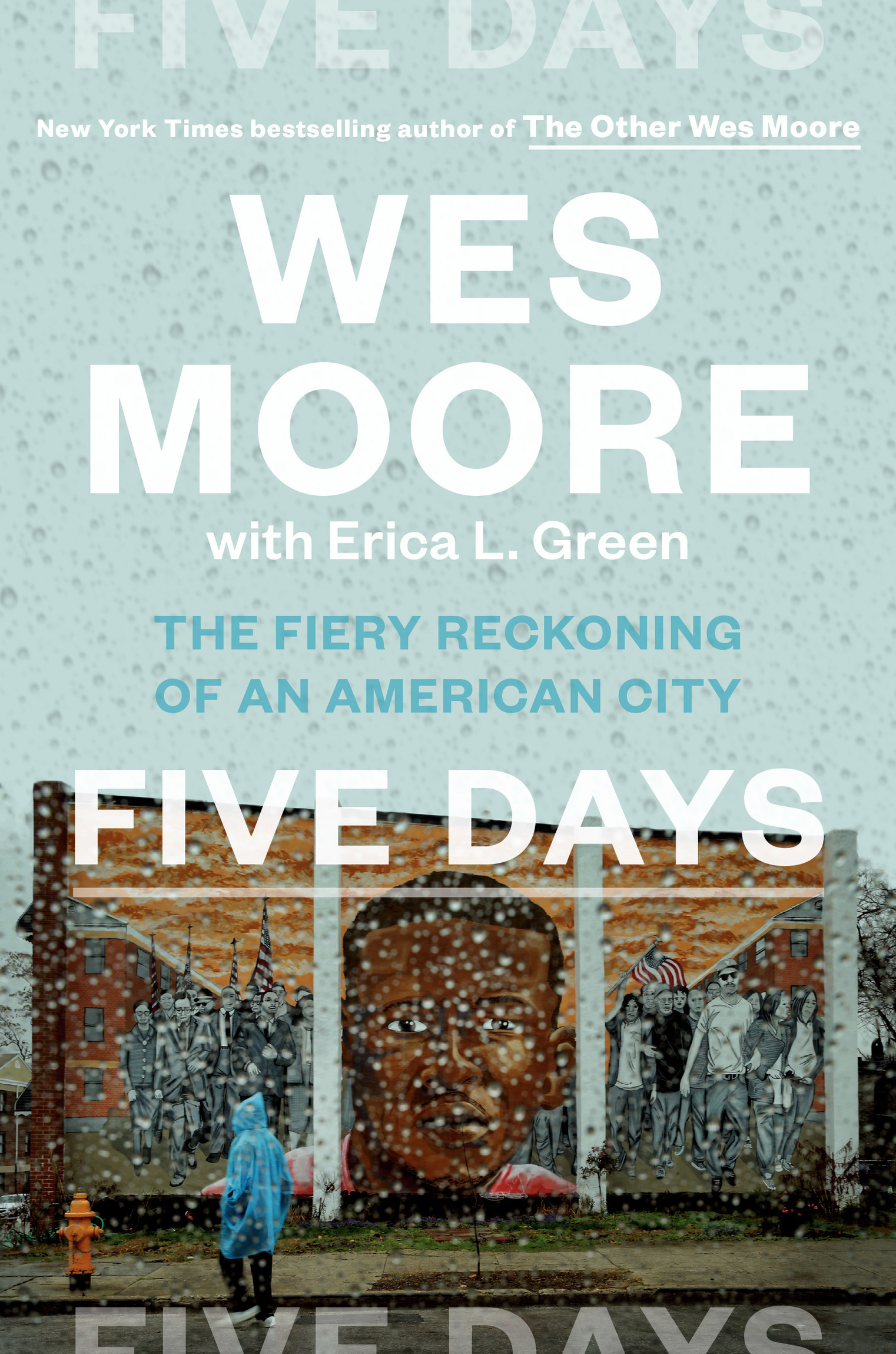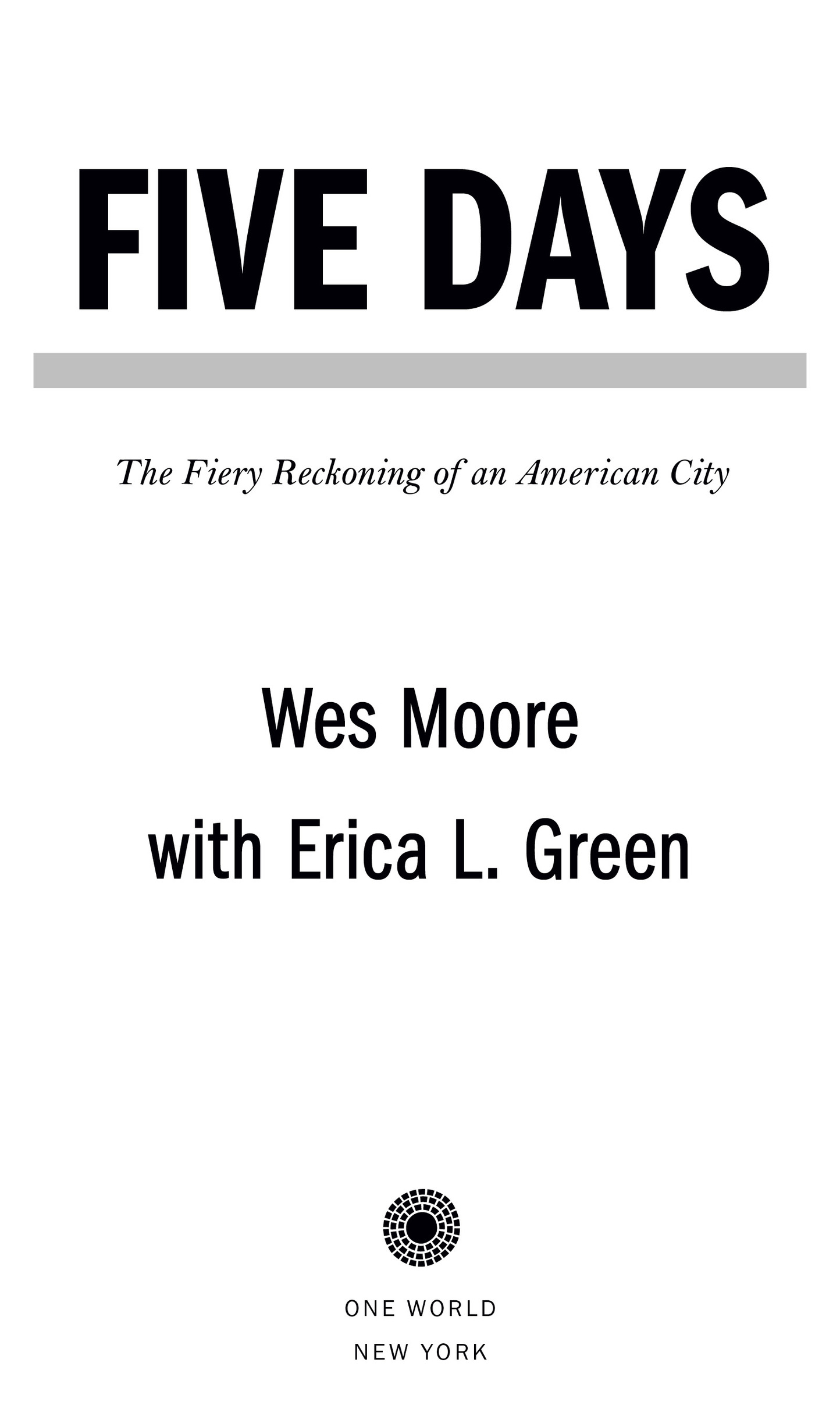Contents
Landmarks
Print Page List
This is a work of nonfiction. Some names and identifying details have been changed.
Copyright 2020 by Omari Literary Holdings, LLC
All rights reserved.
Published in the United States by One World, an imprint of Random House, a division of Penguin Random House LLC, New York.
O NE W ORLD and Design is a registered trademark of Penguin Random House LLC.
LIBRARY OF CONGRESS CATALOGING-IN-PUBLICATION DATA
Names: Moore, Wes, author. | Green, Erica L., author.
Title: Five days : the fiery reckoning of an American city / Wes Moore with Erica L. Green.
Description: New York : One World, [2020] | Includes index.
Identifiers: LCCN 2019048820 (print) | LCCN 2019048821 (ebook) | ISBN 9780525512363 (hardcover) | ISBN 9780525512370 (ebook)
Subjects: LCSH: Baltimore Riots, Baltimore, Md., 2015. | Gray, Freddie, 19892015. | Police brutalityMarylandBaltimore. | African AmericansMarylandBaltimoreSocial conditions. | Baltimore (Md.)Race relations.
Classification: LCC HV6483.B35 M66 2020 (print) | LCC HV6483.B35 (ebook) | DDC 363.32/3097526090512dc23
LC record available at https://lccn.loc.gov/2019048820
LC ebook record available at https://lccn.loc.gov/2019048821
Ebook ISBN9780525512370
randomhousebooks.com
oneworldlit.com
Book design by Caroline Cunningham, adapted for ebook
Cover design: Greg Mollica
Cover image: Chip Somodevilla/Getty Images
ep_prh_5.5.0_c0_r0
Contents
Prologue
I SAT IN THE FARTHEST PEW from the front in a Baltimore chapel, staring at the flawless ivory-colored casket of a twenty-five-year-old man. Afraid to go any closer. Wondering why I was even this close. High above his casket on the back wall of the chapel, the words Black Lives Matter were projected onto a screen, as if the aspirational slogan and the body below were not statements in violent contradiction.
It was the morning of Monday, April 27, 2015, and I was at Freddie Grays funeral. Three weeks earlier, on April 12, 2015, a police officer on a bicycle had made eye contact with the still-living Freddie Gray, a young man from the Sandtown-Winchester/Harlem Park section of Baltimorethe wrong side of Baltimore, a neighborhood where life expectancy was not quite sixty-five years, a full seven years shorter than in the rest of Baltimore and around the same as someone living in North Korea. Gray met the officers eyes and ran. The officer gave chase, soon joined by two others, and soon Gray was captured. The police searched him, and when they found a pocketknife in his pocket, they arrested him. When he couldnt, or wouldnt, walk to their transport van, they dragged him along the sidewalk. What happened next was a matter of dispute. But when Freddie Gray died a week later, from a severed spine, much of Baltimore believed the police had killed him.
That belief didnt come out of nowhere. What was life like if you grew up like Freddie Gray? The fear of being a victim of police brutality was ever present if you were young and black in Baltimorejust one more trial for kids who already carried the mental anguish and physical adversity of growing up in chronically neglected neighborhoods. You knew neighbors, cousins, uncles, aunties, and friends whod been victims of random or targeted violence. The violence was physical but correlated with the emotional violence that was often its cause or consequence. And the violence was pervasive, a factor in every decision you madewhich streets you walked down, what time you started and ended your day, whom you trusted. The most quotidian decisions were shaped by structurally determined abnormalities. You called it life.
In that chaos, you feel a need to rely on the institutions that supposedly are in place to support you and your family: your school, your place of worship, your city government, your fire department, your police department. The individuals who make up these institutions pledged to uphold your best interests and safety, to protect and serve. But what happens when those pledges are broken, when those institutions break down? What happens when it no longer feels like the schools are deepening your education or preparing you for work? What happens when houses of worship feel void of spirituality and unresponsive to your everyday needs? What happens when your political representatives seem to be more concerned with the interests of the wealthy and already powerful and are careless or contemptuous in the face of genuine human pain and distress? And what happens when the people who are paid to protect you are your predators? Your institutions of support become your captors. Your saviors become your jailers.
Freddie Gray and so many other boys like him grew up in the type of poverty that permeates everything: how you are educated, the water you drink, the home you live in, the air you breathe, the school you spend most of your day in, the way you are policed, whether or not you will die in the same poverty you were born in. It was that poverty that raised the probability that Freddie would be exactly where he was on April 12, 2015, and then again on April 27, 2015. In fact, the odds started being stacked against Freddie generations before he was born.
Harvard economists Raj Chetty and Nathaniel Hendren released a report right before Freddie Gray was arrested for the final time. The report compiled years of research on the best and worst places in America for young children born into poverty to grow up. Many of the best places were in the DMV areathe District of Columbia, Maryland, and Virginiaincluding Montgomery County, Maryland, a jurisdiction that hugs the nations capital and consistently has the highest-rated schools in the state of Maryland. Montgomery County is also a little more than twenty-five miles from the jurisdiction that Chetty and Hendren reported as the worst place in the country to be born poor: the city of Baltimore, Freddie Grays place of birth.
For every year of his life spent in Baltimore, the report stated, a poor boys earnings as an adult would fall by 1.5 percent. When you factor that in for an entire childhood and early adulthood, the average twenty-six-year-old man who grew up poor in Baltimore would earn about 28 percent less than if he grew up anywhere else in the country. But why?
Its not an accident. Poverty is so concentrated because it is generational and, research shows, created with relentless intention. Redlining, predatory lending and discriminatory covenants, blockbusting, and forced segregation all constrained opportunities and cut off pathways to increased material and social capital for generations of black Baltimoreans. Transportation lines were drawn to prevent these communities access to jobs and servicesand, just as importantly, to keep the haves and have-nots separated. Underfunded and poorly managed schools failed to serve as engines of economic mobility for families. Talented teachers and administrators were provided greater incentives to move on than to stay on. The same applied to students, who dropped out at alarming ratesand even the ones who graduated from a Baltimore high school did so largely unprepared for higher education or employment.
I am from Baltimore but run the largest poverty-fighting organization in New York Cityone of the largest in the country. I spend a great deal of time in economically distressed communities in New York: Brownsville, East New York, the South Bronx. These places are nationally known, statistically and anecdotally, for their significant challenges when it comes to creating true and sustainable economic mobility. New York in no way has poverty defeated. The life expectancy in Brownsville, Brooklyn, is seven years shorter than the average life expectancy in the city as a whole. The South Bronx neighborhoods of Mott Haven and Melrose have three times as many hospitalizations for asthma as the rest of the city. But the truth is I would rather be born poor in New York than in Baltimore.

